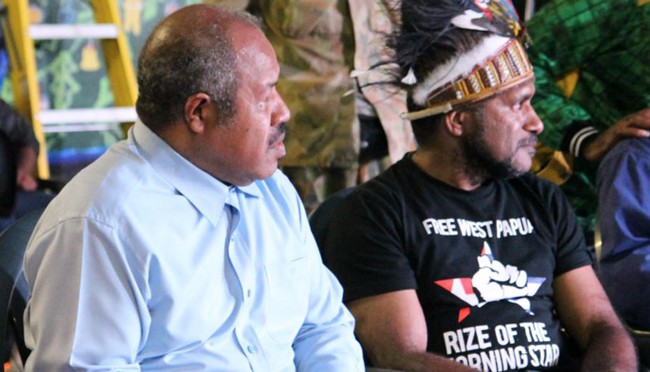
West Papuan demo in Moresby defies PM
The arrest of West Papuan activists for ‘unlawful assembly’ in Port Moresby last week at a pro West Papua independence rally prompted a torrent of online views and opinions from PNG nationals. Arrested and later released on bail conditions were PNG nationals Fred Mambrasar, Tony Fofoe, and Patrick Kaiku. The PNG-based pro West Papuan campaigners received warnings from the PNG Prime Minister Peter O’Neill against the proposal to raise the West Papuan ‘Morning Star’ flag in Port Moresby to mark the West Papuan national day on December 1 2013.
In defiance of Prime Ministerial orders, clearly intended to avoid a stoush with Indonesia, the event resumed supported by renowned West Papuan sympathizer, event host and National Capital District (NCD) Governor Powes Parkop. When PNG police moved to disband the 1000-strong campaigners the ceremony continued on invitation from NCD Governor Powes Parkop at his municipal government headquarters in Waigani. Mr Parkop’s intervention also blocked earlier attempts by PNG police and immigration officials to arrest and deport UK-based West Papuan activist, Benny Wenda, and Australian human rights lawyer, Jennifer Robinson.
According to reports bail was set at K250 each reduced from the hefty K10, 000 on conditions that the campaigners report fortnightly to the District Court and further that no pro-West Papuan ‘political activity’ ever resumes.
PNG’s Women in Politics (WIP) President, Maria Ebai-Hayes denounced the disruption to the symbolic Melanesian gesture supporting West Papua’s long-standing quest for independence from Indonesia. Hayes reacted to the ‘use of state powers to frustrate an exercise of rights of freedom of expression guaranteed by the PNG Constitution’.
In the New Guinea Islands at the government headquarters in the Autonomous Region of Bougainville (ABG), a similar Morning Star flag-raising event took place on December 1 2013 sanctioned by provincial authorities. A 2015 referendum to determine Bougainville’s own autonomy from PNG is scheduled according to a peace agreement between PNG and Bougainville.
PNG bloggers thanked Governor Parkop for his ‘brave stand’ in diffusing tension even as he defended Melanesian solidarity, PNG’s own sovereignty, and the people’s rights and freedoms. Support, speculation and disgust within social media networks in PNG and elsewhere over the basis of the arrests continue to fuel the conjecture over ‘who’s orders and who’s interests’ were being served within the arrest orders and detention of the West Papuan activists.
In contrast to the fact that PM O’Neill warned against West Papuan ‘political activity’ in Port Moresby, in Vanuatu this week Prime Minister Moana Carcasses met with Uri Joweni, senior military
commander of the rebel OPM Free West Papua Movement.
Chief amongst the online chats were the usually veiled concerns over issues of Melanesian solidarity, human rights and self-determination of West Papuans. Ethnic, historic and geographic links between West Papuans and their Papua New Guinean neighbours present bold reminders of the glaring similarities and forced differences between these Melanesians who share an invisible international border that separates West Papua from the independent state of Papua New Guinea.
Despite there being much sympathy among PNG nationals for their “wantoks” over the border, this is rarely expressed at an official, political level, making Powes Parkop’s bold speech all the more remarkable.
